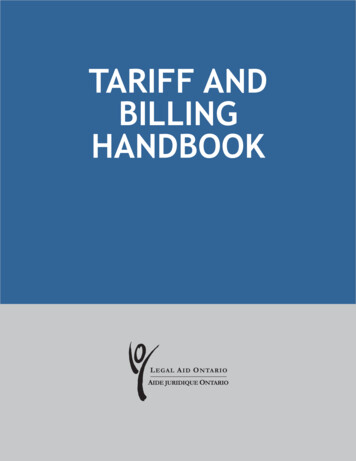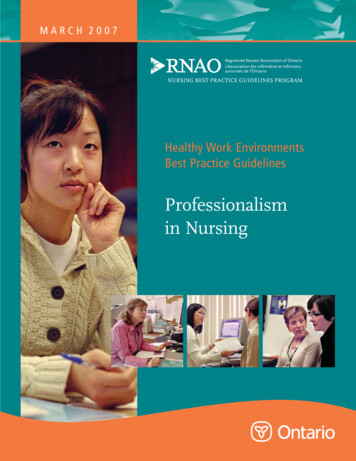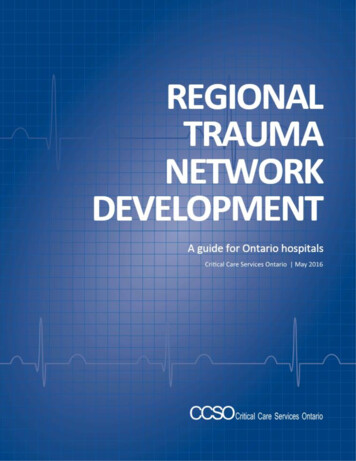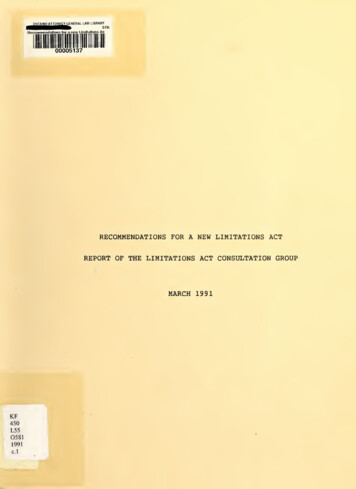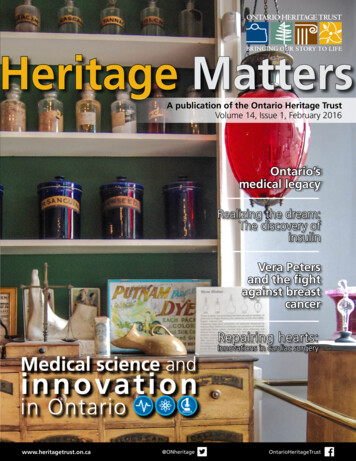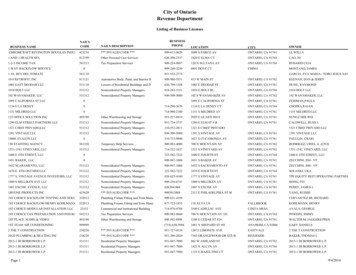
Transcription
The Ontario Council on University Affairs:A Buffer AgencyCOLIN GRAHAM'*Ernst Young, Chartered Accountants, TorontoMember, Ontario Council on University AffairsThe Ontario Minister of Colleges and Universities frequently has causeto consider the views of the Ontario Council on University Affairs(OCUA). OCUA strives to fulfil two roles: to serve the Minister as acontinuing source of independent advice on the Ontario university system(in a sense "thinking for the Minister") and to serve as a buffer betweenthe province's universities and the provincial government and, sometimes,between the universities themselves.Ministers are supported as politicians by their political parties in theLegislature and, as ministers, by both personal political staffs and theconsiderable number of civil servants in their ministries. Besides thesesources of expertise, members of the public affected by government actionsmake representations both to the civil service and to the ministers. Why,then, are other structures such as OCUA needed?OCUA and its counterparts can be thought of as "buffer agencies".Parliamentary systems of government such as ours depend on ministerialresponsibility and cabinet solidarity. Patrick Beard in his tract, "TheOntario Council on University Affairs: What, Why and How?" (July 1983),has noted that buffer agencies serve to remove from ministerial control,and thus from ministerial responsibility, matters which it is thought bestin the public interest (or in the interest of the politicians) to put beyondthe reach of day-ta-day politics.The buffer device has been widely used in Canada both federally andprovincially. Marketing boards, regulatory agencies, and Crown corporations are a common feature of Canadian public life. While the need forimpartiality towards government itself may inspire the creation of someof these bodies, many result from the unwillingness (or inappropriateness)of government to engage in certain activities that the public interestrequires be subject to public control. The scope of activities that meet thiscriterion will vary according to public and political moods.(Some of the most visible of such bodies are the arts councils at thenational or provincial level. Many people believe that decisions on arts17
funding should be based on artistic criteria alone. They do not entirelytrust politicians as such to be able to apply such criteria because politiciansare perceived as lacking expertise and are thought to be susceptible topolitical pressures to give out money on other grounds.)In the field of post-secondary education most of the other provinces haveintermediary bodies similar in function to OCUA, as do other jurisdictionsin the United States and the United Kingdom. Each body, includingOCUA, is very much the product of unique political and historical factorsin its particular environment and each is subject to pressure by politicians,civil servants and the various interest groups in the universities. OCUAitself is the product of an evolutionary process which began in the 1950sand continues today.This is a good time for a description of the Council and its work, and forcomments on it, as the Council has recently had its five-year "sunsetreview". Dr. John Stubbs, President of Trent University, completed thereview and reported to the Minister in July 1988, in the Report of theExternal Advisor to the Minister ofColleges and Universities on the Future Roleand Function of the Ontario Council on University Affairs and Its AcademicAdvisory Committee. The Minister accepted Dr. Stubbs' recommendationsin May 1989, agreeing to a larger research staff and thus a greater policyrole for OCUA. This article draws on Dr. Stubb's Report and on thepreviously noted paper by Patrick Beard when he was on the researchstaff of OCUA.HistoryPrior to the 1950s there was no provincial government office or agencywith responsibility for government relations with Ontario universities.Such decisions as were required, usually concerning funding, emanatedfrom an informal process involving personal contact among the premier,the university presidents and, sometimes, those chairing the variousboards of governors.In the early 1950s it was perceived that more attention needed to be paidto the universities and Dr. R.C. Wallace, a former Principal of Queen's,was appointed as a part-time consultant to advise the Minister ofEducation on the co-ordination and funding of their activities. He wassucceeded by several other advisors until, in late 1956, an internal andrelatively informal government committee was formed consisting of theProvincial Treasurer, the Minister of Education, and senior treasury andeducation officials. This committee went through several phases until in1961 the Advisory Committee on University Affairs (ACUA) was formedwith, for the first time, some members from outside government (although18
not academic members). This was the first effort to provide an impartialbuffer that would give the government good and acceptable advice, protectthe universities from direct governmental intervention and, incidentally,protect the universities from each other. (In 1962, the universities gottogether themselves when the university presidents formed the forerunnerof the Council of Ontario Universities (COU).)In 1964 the ACUA added academic representatives. The present OCUAwhich evolved from the expanded ACUA, dates from 1974, when it wasestablished with 20 members, a secretariat, a full-time chairperson and apolicy of publishing specific recommendations together with explicitwritten arguments, where previously the recommendations only werepublished and the rationales were left to unpublished minutes.The chairperson and 19 other members are appointed by order-in-counciland are selected from a broad range of interests, sectors and geographicregions in Ontario, with a slight majority appointed from the communityat large. The current chairperson, Dr. Vivian Nelles, on leave for threeyears from York University where he is a professor of history, is the onlyfull-time member of Council. There is also a full-time research staff of sixand three administrative support staff-a substantial increase in 1989 fromprevious years when the staff was about half this size.Current ActivitiesOCUA operates in three principal areas:(1)Standard areas where advice is expected or offered annually, forexample, on funding requirements for the system; allocation ofthe operating grant; special "envelopes" to individual institutions;and approval of funding for new graduate and undergraduateprofessional, quasi-professional and special programs (regularundergraduate arts and science programs do not need approval);(2)Ministerial references, for example, studies of research overheads;inter-institutional equity; the indirect costs of co-operative education; and, from time to time, the operations of financially troubledinstitutions;Initiatives arising from OCUA's internal deliberations and requests from the university community or external agencies. InMay 1989, for example, OCUA asked institutions, student groups,and other organizations for their opinions on an accessibilitypolicy for Ontario universities in the 1990s, on current tuition-feelevels, and on the needs of part-time and continuing educationstudents. In February 1989 it held hearings on the question of(3)19
whether private "universities" should be allowed and empoweredto grant degrees. (Currently in Ontario only publicly fundedinstitutions are permitted to use the title "university" and to haveunrestricted undergraduate and graduate degree-grantingpowers.)MembershipWhile OCUA members are appointed by order-in-council, nominationsare submitted by various organizations and individuals. Even the Ontariouniversities' own organization, the Council of Ontario Universities, submits nominations. While individuals may be drawn from certain constituencies, they are not viewed as representatives for those groups andare expected to act from a broad viewpoint. Members serve for a three-yearrenewable term, usually renewed only once.Nevertheless, since 1974 there have been some specifically representativeaspects to appointments to membership in OCUA:-a 50/50 split between university and non-university representatives(changing in 1989 to a slight majority from the community at large)- at least one bilingual member from the University of Ottawa- at least one member from Northwestern Ontario and one memberfrom Northeastern Ontario- at least one person from the secondary school sector- at least one university studentAccountabilityOCUA is accountable to the provincial cabinet through the Minister ofColleges and Universities. This accountability is achieved through theformal process of submitting advisory memoranda containing all ofOCUA's advice to the Minister, who in tum responds formally, sooner orlater, to each recommendation. The advice is usually accepted, with theexception of advice on the overall funding level, which has consistentlybeen rejected. The annual report published by OCUA contains alladvisory memoranda and reports. In addition there are regular meetingsbetween the chairperson of OCUA and the Minister and senior Ministryofficials, occasional meetings of these people with members of Council,and frequent contact by staff of OCUA with staff of the Ministry.Last year OCUA issued 11 advisory memoranda covering topics such asthe allocation of the 2 billion of operating support funding for theuniversity system in the coming year; a framework for increasing generalaccessibility to Ontario universities in 1989 and beyond; the mission,20
programs and funding for Algoma College; and enhancing access ofdisabled students to Ontario universities.Spring HearingsOCUA may take into account any interests or factors it considers relevantin developing its recommendations. A major source of information andadvice is provided through the Council's Spring Hearings, a tradition thatgoes back to 1967. OCUA travels to a number of university campuses tohold meetings with officials and representatives from the various institutions and organizations for which it has responsibility. Typically, in thewinter the chairperson will send a letter to the various university presidentsoutlining the topics for discussion, the information being requested, andthe deadline for written briefs to be received before the hearings.The hearings themselves are open to the public and the media but rarelydraw much interest. Attendance by members of boards of governors isdisappointingly rare. As we all focus on the problem of maintaininginstitutional independence while achieving expected levels of accountability, I believe university board members should become more involvedin institutional dealings with OCUA and so gain a greater understandingof, and involvement in, policy issues.Sub-CommitteesMuch of the Council's work is undertaken through its subcommittees:Bilingualism and Francophone Affairs, Funding, Institutional Policy,Program, and Student Affairs. A related committee, the Academic Advisory Committee, is composed of seven academics appointed by orderin-council. They are not members of OCUA but advise it from the"outside". This group is broadly representative of university disciplinessuch as the humanities, life sciences, and social sciences and carries outfour major reviews:-a review of the Council of Ontario Universities' annual compilationof graduate macro indicators;- a review, from time to time, of the operation and effectiveness ofCOll's program-quality appraisals;- a review of the results of COU's appraisals and assessments and ofthe implications for continued funding of any existing graduateprograms; and- a review of proposals for any new graduate programs as well asundergraduate professional, quasi-professional, and specialprograms, according to OCUA's criteria.21
The committee is something of a "buffer's buffer". Some feel it unnecessarily duplicates the work of the Ontario Council of Graduate Studies butit appears from past history that both OCGS and COU occasionally findit impossible to deal as a collectivity with the politically sensitive criteriaof need and institutional appropriateness-one of the reasons the AACwas established in 1982.Interaction with Community CollegesSadly for post-secondary education, there has not been much interactionbetween the Council of Regents of the Ontario community college systemand OCUA, reflecting the sharp distinction that has existed in Ontariobetween the colleges and the universities. The core of that distinction is alegal one, but of course philosophical distinctions are made as well. AsCrown agents, the colleges are formally part of the government's postsecondary educational system while the universities, although also part ofthat system, are autonomous self-governing institutions.There are signs that more interaction will take place. The Challenges forthe Future conference last year was attended by board, f(lculty, andadministrative representatives from both systems. The chairpersons ofOCUA and the Council of Regents are now formally cross-appointed toeach other's boards. In my view much greater interaction is needed-atthe local level between colleges and universities, between OCUA and theCouncil of Regents, and between the college and university sections of theMinistry.Francophone EducationThe Council for Franco-Ontario Education, established in 1980, is responsible for advising the Minister of Education and the Minister of Collegesand Universities on all matters relating to Franco-Ontarian education,while OCUA is responsible for advising on the costs related to thebilingual grant. This division of responsibilities, while technically clear,does lead to misunderstandings in practice, as the francophone community emphasizes French university programming while OCUA stressesbilingual programming. This diversity of views shows the risk of creatingparallel buffer bodies that lack authority to resolve disputes betweenthemselves. Ultimately the Minister decides which, if any, to heed, at therisk of losing some of the distance from politics that the buffers wereintended to create.Widespread accessibility to university education has been one of thehighest priorities for the Ontario government since the 196Os. Enrolmentgrowth in universities (in recent years the equivalent of two universities22
the size of McMaster or Queen's have been added to the permanentenrolment in Ontario) has outstripped the additional funds being madeavailable to the system. This has put under stress OCUA's latest (1987)revision of the formula by which the government allocates money to theuniversities. These funding formula changes are taking place in a periodwhen it seems post-secondary education will not be able to get all thefunds it believes are needed to maintain existing levels of service withrespect to existing enrolment, to enhance support for the research infrastructure, to initiate a program of quality improvement, to accommodate more students, and to take new and necessary initiatives.OCUA's greatest current problem has been understanding the environment and policy priorities in the universities and in the government tocome up with a practical new funding formula for 1990-91 and beyondwhich takes into account recent enrolment growth and which will promotea co-ordinated and planned approach to future enrolment. The Ministeraccepted proposed revisions in 1989 which it is hoped will be enrolmentsensitive, equitable, and predictable, yet have sufficient annual stabilitybuilt in to meet the needs of the institutions.Buffer Leads to BetterWith the enthusiastic acceptance of Dr. Stubbs' recommendations by theMinister, the Council has acquired a greater ability to influence policy.The fine group of critical thinkers who make up its membership will notlack issues to consider in addition to offering their regular policy advice.Two interesting issues loom on the horizon: (1) To what extent will publicconcern for accountability, quality, and effectiveness alter the structure ofhigher education?; and (2) How are the values of higher education to beasserted and measured if social utility and labour-force criteria are theparamount tests? The Minister will clearly benefit from the Council'sindependent policy suggestions with regard to these issues as will theuniversity system itself, a system which, I believe, is significantly betterbecause of the work of ceUA23
- a50/50 split between university and non-universityrepresentatives (changing in 1989 to a slight majority from the community atlarge) - at least one bilingual member from the University ofOttawa - at least one member from Northwestern Ontario and one member from Northeastern Ontario - at least one person from the secondary school sector



